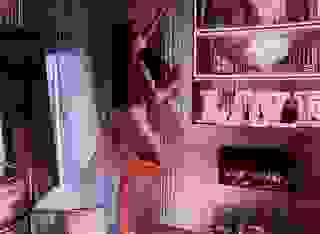- Romance
- The Last Good-bye
Note: You can change font size, font face, and turn on dark mode by clicking the "A" icon tab in the Story Info Box.
You can temporarily switch back to a Classic Literotica® experience during our ongoing public Beta testing. Please consider leaving feedback on issues you experience or suggest improvements.
Click hereIt was a tearful good-bye, she clung to me as if she would never let me go, as if in letting me go, she would never see me again. This touching scene was interrupted by the final boarding call for my flight to London.
"I've got to go now, I'll see you in a week."
She gave me one last, lingering, kiss. "'Bye, you behave, and don't go falling for any beautiful women over there." These were her usual parting words. She knew that I would never do that to her.
"As if I'd do that to you. Take care, I love you." I kissed her quickly and walked through the gate to the boarding ramp.
We had been married now for five years and, I knew that this would be the last time that we would go through this parting. What Sylvie was not aware of was that I knew, deep inside me, that she would not be waiting for my return.
Ours had all the hallmarks of a happy marriage, we had a lot of friends, some had been friends from before we married, and some had become friends from work contacts since then. We had dinner parties on a regular basis and attended even more given by friends. Our social life was full and without any relationship tensions. We were even talking about starting a family, but these discussions had never gone beyond the talking and of course the practise, regular and intense practise. Our sex life was frequent and great. At least it was until recently.
Over the past couple of months I had detected a difference in Sylvie. She seemed to be a little quieter than usual, laughed a little less, and her kisses lacked the intensity of before. At first I put it down to familiarity taking over our lives and tried to spice up our lovemaking. She went along with it, but lacked enthusiasm. She stopped telling me about her work and when I discussed my work her response was, 'that's nice', with all the sincerity of a checkout operator saying 'have a nice day'. If I didn't know better I'd say that her final kiss was a return to the glory days of our marriage, but I knew better. In seven days I would return to nothing but an empty house.
He was a work colleague, her new boss and a new inclusion in the office where she worked. I admit that he was better looking than me, handsome according to some. He was taller than me, had broader shoulders and narrower waist. He dressed to impress at all times, or so I was told the last time that I slobbed around in trackies on a Sunday. I didn't see the need to impress in my days off even though Sylvie was always immaculately presented. I had to be immaculate the whole time that I was on the job, and considered that to be enough.
For the best part of the next week I would be sitting in a conference room, listening to dozens of climate experts giving their opinions about where the world will be in twenty years from now if we do not curb the amount of greenhouse gas emissions we pump into the atmosphere. I would have my chance to deliver my findings and, while I was sure of them, I knew that they would not be well received.
I was here as the head researcher to support the minister representing the Australian government at this conference. The previous government was big on rhetoric, using words designed to appease the Green senators who they needed to get their legislation through parliament. What the minister knew, but was prepared to distance himself from if necessary, was that I had been asked to present the findings of my research into a climate change model that I had been working on for some years. This model was controversial in that it didn't support the current theories being thrown around.
I sat through the first day's presentations without having to concentrate on what was being said, I'd heard it all before, the industrial powers had to stop discharging greenhouse gases into the atmosphere or we'd all die. The problem with this was that the major polluters were not about to take the necessary measures to curb the emissions, because they would lose their competitive edge, and the cost would be too high because of job losses due to production being moved offshore to countries that had no pollution caps.
My mind kept wandering back to Sylvie and my future, or lack of it, with her.
The delegates were filing from the auditorium, me included, when a voice behind me stopped me in my tracks. "Sam, wait." I recognised it from my university days. I turned to face Maggie Houghton. "Where were you today?"
"I've been here all day." I was puzzled by her question, I knew that she had seen me.
"The body was here, but your mind has been thousands of kilometres away."
"I was concentrating on my presentation tomorrow."
"Bullshit! Knowing you, you have it down pat, every little detail is etched into your brain. You probably even recite it in your sleep." This was true, well not the bit about reciting it in my sleep, I wouldn't know about that. "There's something else rattling around in your skull. Tell auntie Maggie all about it."
This was the Maggie of my past, the person who I'd been able to talk to about my problems, who knew the answers to them and let me work it out for myself while believing that she had solved them for me. It was she that gave me the courage to ask Sylvie out for our first date, and that took some doing, Sylvie had her pick of all of the eligible males among our classes.
"Do you have ten hours?"
"Sure thing, your place or mine?"
"Neutral territory would be safest." We had been lovers early on at uni, but had both decided that we were better friends that we could ever expect to be as marriage partners. But that didn't mean that the temptation wasn't there still, I just had to not put myself into a situation where I would have to resist it.
"Coward. I promise that I won't try to lure you into my bed, after all I am a married woman now."
"Oh, when did all this happen? Why wasn't I invited to the wedding?"
"A couple of months ago. It was an impulsive act on my part, he'd been pressuring me for ages and I gave in. He knew about us and I wasn't going to have you there, hovering in the background to remind him that he was my second choice, even if you were married to the most gorgeous girl around."
"How about dinner first, and then see what happens. I suppose that he's not here by any chance."
"No, he's swanning around the Amazon jungle assessing the damage caused by tree clearance."
"I've got to go and talk to George (the minister) about tomorrow, there will probably be a press conference after my presentation and we need discuss his distancing himself from my research findings."
"That good huh? I can't wait for it. I'll meet you in the restaurant at the hotel in half an hour, that'll give me time to tart myself up."
"You only need five minutes and you know it, but half an hour it is."
"Aren't you sweet, you've not forgotten how susceptible I am to flattery." She kissed me on the cheek and walked off.
Magdalene (Maggie) nee Houghton and now Richards, was one of the brightest students in my year at uni, and great things were expected of her for the future. She hadn't let them down. She had won a research grant to conduct studies into the effects of the rise in ocean temperatures on coral reef systems. This research combined her Oceanography qualifications with her interest in Marine Biology, and kept her submerged for a lot of her time watching the reef ecology. I had read the findings so far and was impressed. Some of them coincided with my research, while others contradicted my findings. Tonight could be interesting.
As it happened, we never got around to comparing notes, Sylvie intervened.
"How's Sylvie?" Maggie asked as soon as we had ordered our meal.
"Fine."
"So that's what you've been thinking about. What's the problem?"
"Where do I begin?"
"Try the beginning, it's as good a place as any."
"Nine months ago she got a new boss, a 'Cleo bachelor of the year candidate'. He wangled a promotion for her so that she would have to work closely with him. I thought nothing of it at first, but then she started working long hours and was always tired."
"And your sex life suffered as a result, is that it?"
I glared at her, she had this way of cutting to the chase, even if I hadn't given it much thought. Who was I kidding, it had been preying on my mind for months now. "Well, if you must know, there has been a change. There hasn't been a decrease in the frequency of our love making, just in her enthusiasm. I've been putting it down to her working long hours, but . . . "
"You've been afraid to face the possibility that she might be having an affair with him."
"Yes."
"Has she said or done anything that would lead you to believe that to be true?"
"Not really, it's just that whenever I ask her about her work she just tells me that it's the same old same old."
"Maybe she just doesn't want to bore you."
"When she dropped me at the airport, her good-bye was tearful and passionate, and that led me to think that she might be over-compensating, and that when I get home she won't be there."
"Jesus Christ, talk about paranoid. I'm sure that she is not even thinking about cheating on you."
"I would believe you except that she has been acting strangely lately."
"And you haven't been?"
"What do you mean?" I knew what was coming.
"Your job requires you to work long and odd hours. Did it ever occur to you that she might have been feeling a tad left out of your life?"
"We have discussed this often enough. This job, while it lasts, gives me the opportunity to carry out my research and get paid very handsomely for it, something that may never happen again, especially after tomorrow. I could find myself out of a job very quickly. Sylvie knows this and has told me that she accepts this, just as she expects me to accept the hours that she works."
"So what's the difference between your situation and hers?"
"For starters there's no potential sexual distraction in my position. I am not confident about hers."
"But you don't know for sure, do you? There has to be a logical explanation for this, I know that Sylvie would never cheat on you, she loves you too much."
"I hope that you're right. Now can we eat." The food had arrived.
Our dinner and a second bottle of wine passed without incident. It wasn't until we reached the door to her room and she invited me in for a night cap that things got a little awkward for me. "What I intend to do is to take your mind off your thoughts of Sylvie, and the best way that I can think to do that is to fuck you for old times sake."
"Don't, please don't even suggest this. It would be very tempting, but I love her too much to cheat on her."
"Well then, you'd better get the fuck out of my room before I rape you. Sheesh, I thought that I was in with a chance here." She kissed me quickly on the cheek before shoving me out the door. "You're a good man Sam, and here I have to settle for second best, and my fingers."
The night past slowly. Some of the time I was rehearsing my presentation, while the rest of the time I was thinking of what Sylvie would be doing about now. I eventually got to sleep, only to be woken minutes later (it wasn't really, a check of the clock told me that I'd had at least two hours sleep) by the clock radio built into the bed head.
I showered and preened myself before heading down for a quick breakfast. Maggie was there, with a smile on her face. "Hi Sam, all prepared for your big moment?"
"I will be once I go back to my room and collect my laptop." I said as I swallowed the last of my coffee.
I was ushered into a room backstage where I was miked up and shown how to connect my laptop into the video system linked to the big screen behind the lectern.
I stood in the wings while the MC began his introductory preamble. "The next speaker comes to this conference from Australia. He is the lead researcher for the Environment Minister, a job for which he has the very best qualifications. He has a Doctorate in Geology and a PhD in Environmental Science. He has had several years of research as a background to his presentation today. As well as that, I have it on good authority, that he's a pretty mean Rugby player and was, at one time, touted as a future Wallaby (Australia's Rugby Union test team). Would you give a warm welcome to Doctor Samuel Phillips!"
There was an encouragingly warm response to the introduction. I walked onto the stage and plugged my laptop in. The screen lit up, showing the first page of my presentation.
"What has the single greatest affect on climate change? Is it CO2? Is it methane? Is it fluorocarbon? Is it particulate aerosol? It is the sun and anything that impedes the benefits to be gained from this solar energy that will cause climate change. What is the most common greenhouse gas in our atmosphere? Is it CO2? Is it methane? Is it fluorocarbon? Is it particulate aerosol? No, it's none of these, the most common greenhouse gas is H2O, or plain old water vapour. Any gas that impedes the infrared radiation that affects the earth's temperature is a greenhouse gas. So you see, to tell the world that we must eliminate all greenhouse gases will mean that we have to do away with the source of these gases, and that means doing away with the oceans and lakes and streams, not something that I would look forward to."
I flicked a graph onto the screen, it showed a breakdown of atmospheric gases. "Two things that we have to realise about CO2 for instance", I pointed to a minute dot on the graph, "is that atmospheric CO2 makes up a thousandth of one percent of CO2 held in oceans, surface rocks, air and life, and that the highest contributor to CO2 emissions is Mother Nature. The gases belched forth a few years ago by that volcano with the unpronounceable name in Iceland, contributed as much CO2 as the last ten years of industrial pollution. More CO2 and other harmful gases, such as sulphur dioxide from high sulphur coal, entered the atmosphere each year during the Industrial Revolution in the 19th and early 20th centuries, than is discharged in today's world. The effects of this pollution saw the advent of heavy smog that cut visibility in London down to less than a metre and resulted in thousands of people dying from respiratory problems. These were bad times for the atmosphere and the environment, but guess what? The world did not get hotter as a result, it actually got colder. The mean annual temperature during the Industrial Revolution was a couple of degrees colder than it is today. There was a mini-Ice-age. (I pointed to my next graph that showed the mean temperatures over the past 200 years) The atmospheric pollution blocked the infrared radiation from the sun warming the Earth and its atmosphere, not to mention that when it rained it wasn't nice clean water that fell from the sky, but diluted sulphuric acid."
"If you go back through the climate history of this planet you will come to realise that climate change is cyclical in nature, that there were periods where the mean temperature was several degrees colder than it is now, while other times it was a similar number of degrees warmer. These were times when man either did not exist, or when his influence would have been so small as to be negligible."
"Various factors have been cited as major contributors to this fluctuation. Sun spot activity, seismic activity, ocean currents, minute wobbles in Earth's axis and differences in Earth's orbit, all have been put forward as contributory factors in climate change, and the one common link between them is that man can have no affect over them, no control over them."
"That we know this is because the Earth itself tells us all about it. As a Geologist, my colleagues and I read what nature tells us about our past. From core samples taken from the Earth's crust and the polar ice, we can read the cyclical nature of climate change, those times when it was warm and dry, and those when it was cold and wet. Of course there were other events that have contributed to climate change. These we call random events, meteor and asteroid strikes and other atmospheric factors, such as particulate clouds caused by comet and asteroid trails, and seismic events. These too, we have no control over."
"Now I'm not here to tell you people that we should ignore climate change all together, but let's get real about this. Let's forget about the buzz words like greenhouse gases and carbon footprints and focus on those things that we can do something about. If we eliminate CO2 from the atmosphere we will all die. We need it in the atmosphere. It is carbon dioxide that plants use in photosynthesis to convert into energy and oxygen. Without oxygen we will die. If you were to look at CO2 emissions you will come to realise that it's not the CO2 that we are emitting into the atmosphere that is the problem, it is the changes that we have made to our environment that have reduced the amount that nature can take out of the atmosphere and convert to oxygen and energy."
"What are these changes? There are two major ones, one that is very visible and one that has slipped under the environmental radar. We have been told about the deforestation of the tropical rainforests it the search for timber for construction, cleared land for cattle grazing to produce beef for hamburgers, and for the production of palm oil that we are now told is harmful. Then there are the changes to our residential and commercial environments. Gone are the houses on quarter acre blocks that provided room for trees and gardens that produced fresh fruit and vegetables, provide shade and a place for kids to play, and oxygen. This has been replaced by smaller blocks and bigger houses. Because of lifestyle changes there are no longer vegetable gardens, we now buy our reasonably fresh fruit and veg from a supermarket that is a part of a major shopping precinct. Because we no longer have the time to spend in the garden, our yards are paved. The net result of these changes is that stormwater, instead of being retained in the soil to nurture the plants with some overflow eventually entering the stormwater drains, is flowing out to sea or wherever. The whole lot is funnelled quickly into drains that can no longer cope with the inflow and back up, causing flash flooding and carrying all of the detritus that we throw away instead of recycling, into the system."
"Another major problem facing Australia is the urbanisation of the areas surrounding the major cities. People are building houses in the bush without thought to the effects that this has on the environment. Part of the natural cycle of things are bushfires, catastrophic fires that in the past just burnt out areas of bush, but now destroy hundreds of houses every year. The solution to this is not to stop the fires, they are needed for the regeneration of native flora, but to either not build in these environments, or build houses that can be protected from these fires. The more severe bushfires are unstoppable crown fires, fanned by strong dry winds and fuelled by the oil vapours created by updraughts, these are self-supporting infernos. The updraught in the bushfires that ravaged Canberra several years ago actually formed a fire tornado, an updraught that was so powerful that houses were unroofed and building materials sucked hundreds of metres into the air. It is all well and good living in a bushland environment, but that environment must be managed to minimised the advent of catastrophic fires. Reduce the fuel load to prevent the updraughts from forming. A couple of days of smoke is preferable to losing all of those houses."
"We also need water vapour in the atmosphere because we need rain to revitalise the soils so that we can grow food to feed the masses. We need to collect rain run-off for clean drinking water. What we need to do is, instead of creating drains that will channel the stormwater away, to delay the run-off and allow it to soak into the ground, to raise the water-table and eventually recharge the aquifer. Create wetland systems that can filter the rainwater before it enters the aquifer, and so that what flows into the dams and oceans is clean water and not muddy, filthy, contaminated water. These wetland systems create an ecosystem for flora and fauna, and bring life back to what was once barren land."








